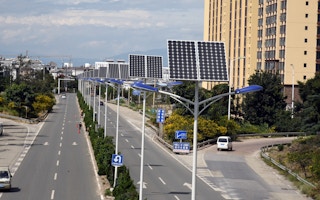China is steadily ramping up efforts to assist other developing countries in addressing climate change, a gesture that has received wide welcome.
Xie Ji, deputy chief of the Chinese delegation to the ongoing 22nd session of the Conference of the Parties (COP 22), said on November 7 that China has ironed out a concrete programme to help other developing countries to become more climate-resilient.
“We will help build up 10 low-carbon pilot zones, launch 100 climate change mitigation and adaptation projects, and offer training programmes for 1,000 climate-related professionals,” he said.
What Xie called the “10-100-1000” project is part of the effort that China has made in recent years to help other developing countries fight against climate change. The country has earmarked a total of 580 million yuan (about US$85 million) since 2011 to help developing countries, according to Zhang Yucheng, deputy director of the International Cooperation Division of the Department of Climate Change of the National Development and Reform Commission (NDRC).
The most recent offer is the South-South Climate Cooperation Fund, a US$3.1 billion fund pledged by Xi Jinping last September to help developing countries address climate issues.
Developing countries in dire need
Developing countries are believed to be more easily affected by climate change than developed ones, as they have to juggle the needs of growing a domestic economy, decarbonising their economic growth, and fighting against climate disasters.
“People in Pakistan are really suffering from multiple disasters brought by climate change,” Muhammad Irfan Tariq, director general of Environment and Climate Change at the Ministry of Climate Change, told China.org.cn on November 9.
Huge floods swept Pakistan in 2010, affecting one-fifth of the country and 20 million people. The floods were then followed by droughts for three consecutive years, Tariq said.
“
We will help build up 10 low-carbon pilot zones, launch 100 climate change mitigation and adaptation projects, and offer training programmes for 1,000 climate-related professionals.
Xie Ji, deputy chief of the Chinese delegation to COP 22
Developing countries are in dire need of advanced technology, climate finance, and capacity building when it comes to adapting to climate change, said Zhang Xiaohua, senior programme officer of the Climate Change Support Team of the Executive Office of the UN Secretary General.
Apart from the more traditional North-South aid programmes, cooperation among developing countries is playing an increasingly significant role in recent years, Zhang told China.org.cn on November 10.
Emerging economies, including China, India and Brazil, have accumulated great experience in tackling climate change, from which other developing countries are ready to learn, Zhang said.
Moreover, when it comes to reaching the goal of the Paris Agreement - keeping the increase in the global average temperature to below 2℃ above pre-industrial levels - international cooperation is important, Zhang said.
China is no stranger to South-South cooperation, said Zhang. Whereas cooperation used to be focused on food, healthcare and other realms, now climate change has emerged as an increasingly important field, he added.
China has signed memorandums of understanding (MoUs) with a total of 27 developing, climate-vulnerable countries to assist them in their fight against climate change.
This year, the country has signed MoUs with nine developing countries, namely, Egypt, Iran, Maldives, Nepal, Mongolia, Vietnam, Cuba, Ethiopia, and Bangladesh, according to Zhang Yucheng of the NDRC.
“Generous proposal from the Chinese side”
“There’s a big debate in the climate change conference that countries which are at the better development stage should support developing countries. China has taken the lead in this and has offered help to developing counties,” Tariq of Pakistan said.
He said that previously cooperation between Pakistan and China was primarily in infrastructure, but now cooperation in climate change is increasing.
China has provided developing countries with energy-saving or renewable energy goods in recent years, ranging from LED tubes and LED road lamps to household solar photovoltaic power generation systems and air conditioners, Zhang of the NDRC said. These green, low-carbon items have been proved useful in developing countries, he added.
Besides low-carbon goods, China has also offered help in capacity building, which is believed to be vital for developing countries for addressing climate change. The country has held 10 seminars on climate change and green low-carbon development this year for climate-related professionals of developing countries, according to Zhang of the NDRC.
Commenting on the China-proposed South-South Climate Cooperation Fund, Tariq of Pakistan said, “It’s a very generous proposal from the Chinese side which will address primarily capacity-building issues in the developing nations.”
Tariq said his department has yet to finalise a plan to access the fund, and then will be talking to his Chinese counterparts. “We intend to take the maximum benefit from this fund,” he said.
This story was published with permission from China.org.cn

















